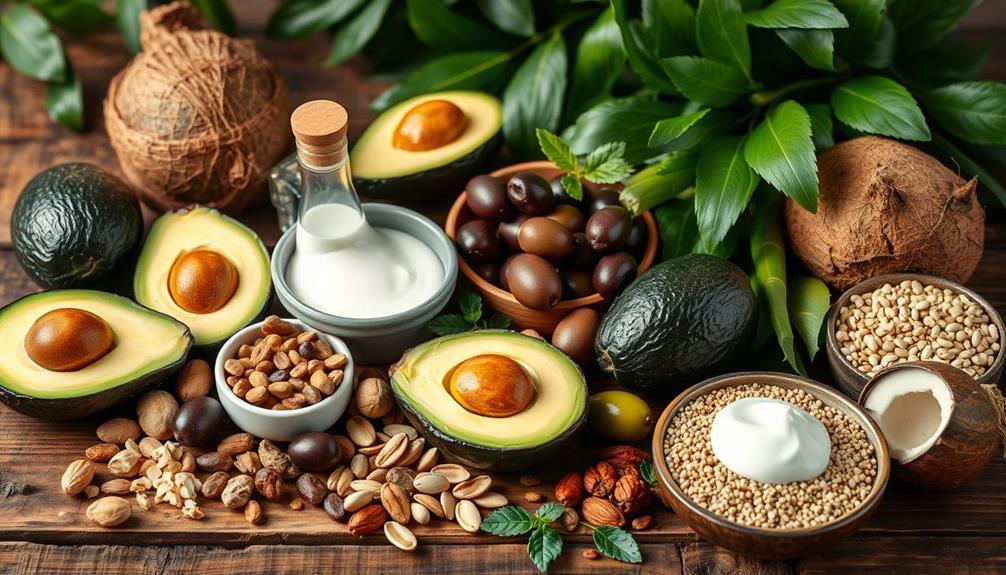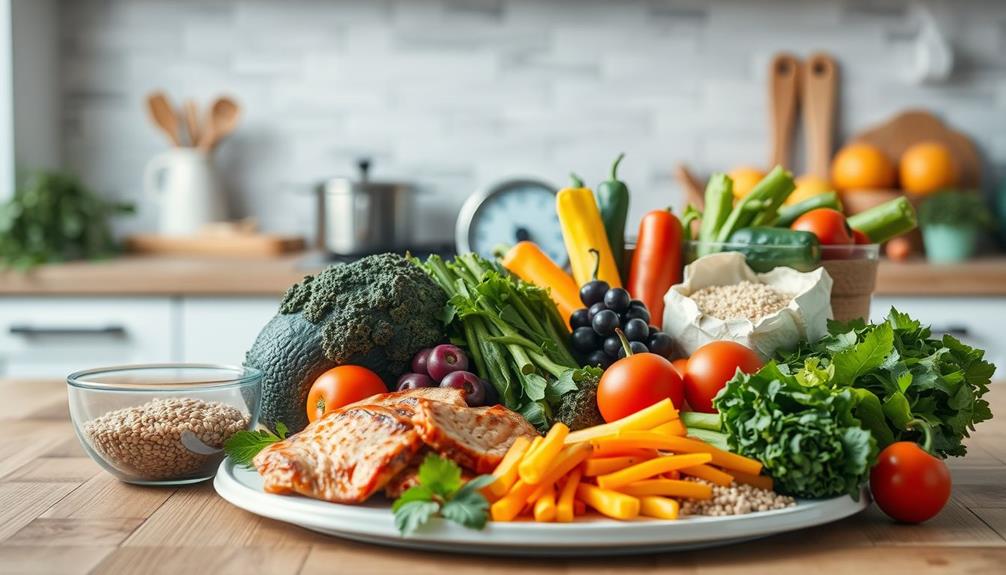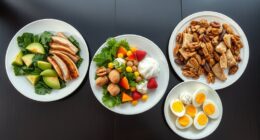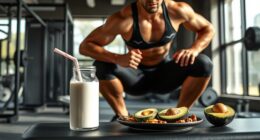To add fat to your keto diet without increasing protein, focus on high-fat foods and healthy cooking methods. Incorporate avocados, coconut oil, nuts, and seeds into your meals. Use olive or avocado oil for roasting veggies and dressing salads. Snack on high-fat options like chia seeds or make fat bombs with coconut oil and cream cheese. Enhance your coffee with coconut oil for an easily digestible fat boost. By prioritizing these nutrient-dense fats, you'll maintain energy and satiety while staying in ketosis. There's more to explore about fat sources that can elevate your keto experience.
Key Takeaways
- Incorporate high-fat snacks like avocados, nuts, and seeds to boost fat intake without increasing protein levels.
- Use healthy cooking oils such as olive oil and coconut oil for preparing meals and salad dressings.
- Create fat bombs using ingredients like coconut oil and cream cheese for convenient, high-fat snacks.
- Blend full-fat dairy products, like heavy cream or full-fat yogurt, into smoothies for added fat without protein.
- Add butter or ghee to vegetables and dishes for rich flavor and healthy fat without adding protein.
Importance of Healthy Fats
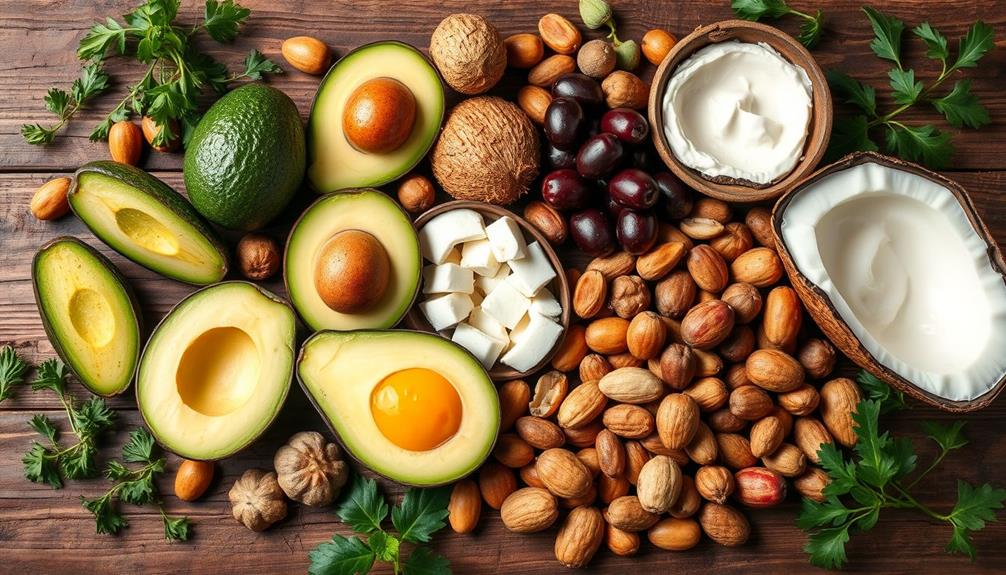
Healthy fats are the backbone of a successful keto diet, comprising 70-80% of your total caloric intake. These fats help maintain ketosis, promoting fat burning for energy, which is essential for anyone on this dietary path. Incorporating healthy fats not only supports your energy levels but also enhances satiety, helping you control hunger and reduce cravings—vital for effective weight management.
Additionally, healthy fats can provide antioxidant benefits, contributing to overall health rich in antioxidants. Nutrient-dense fat sources, like avocados, nuts, and high-quality oils, provide essential fatty acids and vitamins that boost overall health. Monounsaturated fats, particularly those found in olive oil and avocados, contribute to improved heart health and may help lower LDL cholesterol levels, making them a smart choice for your diet.
Additionally, medium-chain triglycerides (MCTs) from sources like coconut oil are rapidly absorbed and can provide quick energy, making them an excellent addition to your high-fat diet. By prioritizing these healthy fats, you'll not only fuel your body effectively but also support significant health aspects, ensuring your keto journey is both successful and sustainable.
Embrace healthy fats, and you'll set a strong foundation for your keto lifestyle.
Nutrient-Dense Fat Sources
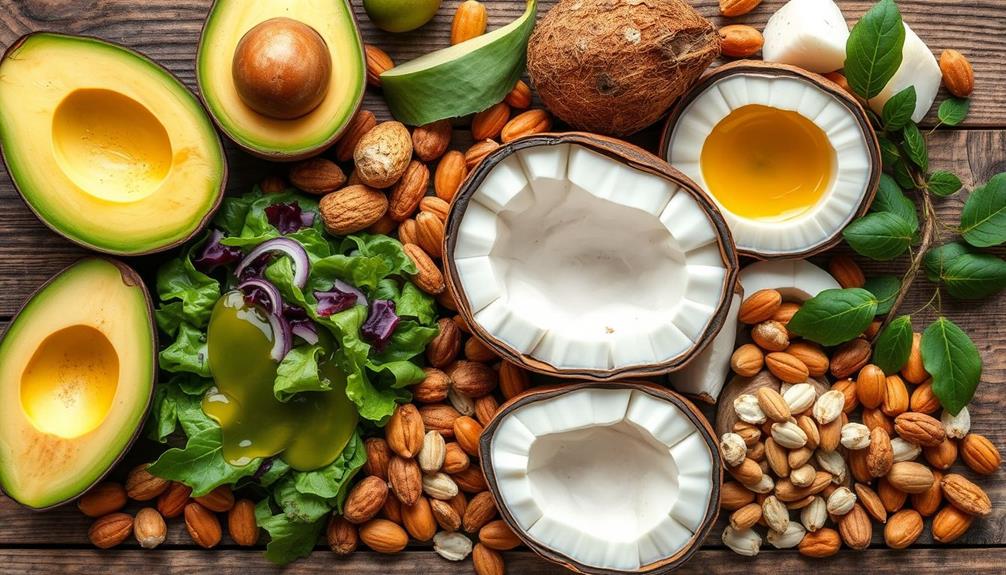
When you're looking to boost your fat intake on a keto diet, nutrient-dense sources are your best allies. Start incorporating avocados into your meals; they're packed with heart-healthy monounsaturated fats, fiber, and essential vitamins.
Additionally, consider the risks and rewards of various dietary choices, including the potential benefits of healthy fats for overall wellness and energy support understanding dietary impacts. Coconut oil is another great option, as it's rich in medium-chain triglycerides (MCTs) that your body can quickly convert into ketones for energy, supporting ketosis without adding any proteins.
Don't overlook nuts and seeds, like walnuts and chia seeds. Chia seeds are particularly impressive, containing 4g of fat and 4g of fiber per tablespoon, making them a nutritious addition to your diet.
Olive oil is also a fantastic choice; it's loaded with monounsaturated fats and antioxidants, making it perfect for drizzling on salads or vegetables to enhance fat content.
Cooking With Healthy Fats
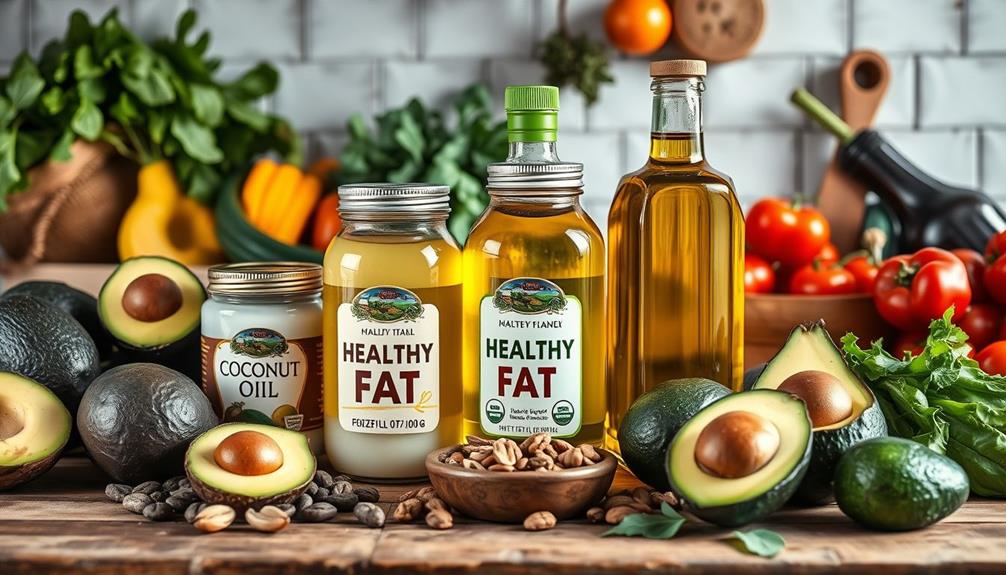
Incorporating healthy fats into your cooking not only enhances flavor but also aligns perfectly with your keto goals. When you cook, reach for oils like olive oil, avocado oil, or coconut oil. These options not only provide beneficial fats but also keep your protein levels low.
You can also add butter or ghee for a rich flavor that boosts healthy fat intake without increasing protein content. Additionally, consider using essential oils like peppermint oil for a revitalizing twist in dressings or marinades, as they can also offer health benefits.
Roasting vegetables in high-quality fats at temperatures above 400°F can give you that crispy texture you crave while increasing fat content. For creamy sauces and soups, use full-fat dairy products like heavy cream or cream cheese. These ingredients help you increase fat content without adding significant protein.
Don't forget about fat bombs! These convenient snacks, made from ingredients like coconut oil and nut butters, are perfect for providing concentrated sources of healthy fats without any protein.
Fats to Limit
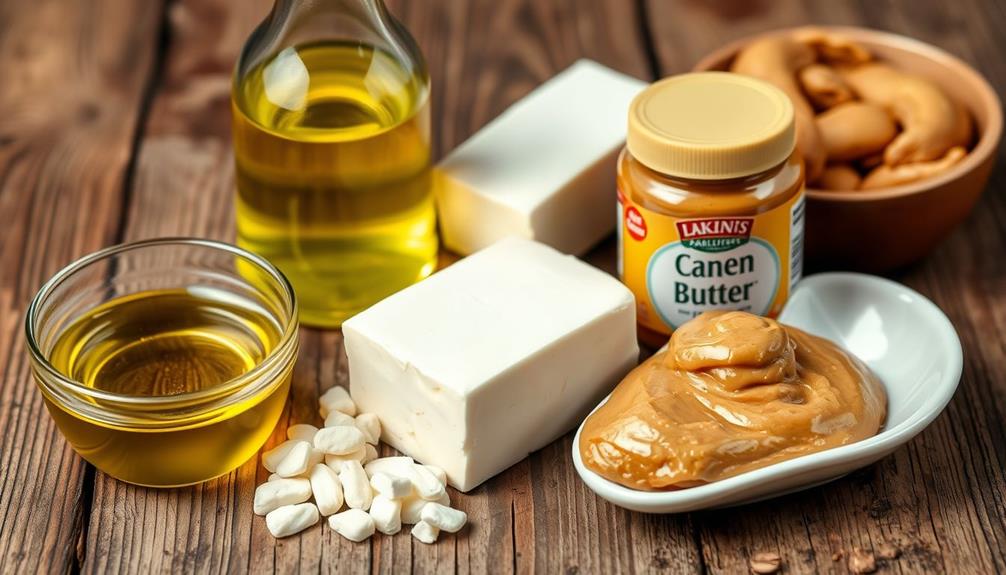
When you're following a keto diet, it's essential to limit certain fats that can harm your health.
Avoid unhealthy trans fats and processed vegetable oils, which can lead to inflammation and heart issues.
It's also important to be aware of how your choices can affect your overall health and longevity, as indicated by the need for a balanced diet rich in fruits and vegetables.
Additionally, be mindful of high-saturated fat sources, especially from processed meats and fatty cuts, to keep your heart healthy.
Unhealthy Trans Fats
While adding healthy fats is crucial to a successful keto diet, it's imperative to avoid unhealthy trans fats, which can undermine your health. Trans fats are artificially created through the hydrogenation process, often found in processed foods. They greatly increase the risk of heart disease and other cardiovascular diseases.
The importance of budgeting for healthy eating can't be overstated, as it guarantees you make informed choices about the foods you purchase. The FDA banned artificial trans fats in the U.S. as of 2018 due to their strong association with adverse health effects, including increased LDL cholesterol and decreased HDL cholesterol levels.
To keep your keto diet on track, here are three tips to avoid trans fats:
- Read Labels: Always check for partially hydrogenated oils in ingredient lists, as these are a major source of trans fats.
- Limit Fried Foods: Steer clear of fried foods, which often contain trans fats, especially from fast-food restaurants.
- Choose Whole Foods: Opt for whole, unprocessed foods instead of baked goods and snack foods, which frequently contain unhealthy fats.
Following the World Health Organization's recommendation to keep trans fats below 1% of your total daily energy intake can help you maintain better cholesterol levels and overall health.
Processed Vegetable Oils
Processed vegetable oils can sabotage your ketogenic diet more than you might think. Oils like soybean, corn, and canola are loaded with omega-6 fatty acids, which can trigger inflammation and undermine your diet's benefits.
Cold medications overview highlights that chronic inflammation can negatively impact your overall health, making it essential to choose your fats wisely. These oils often go through heavy industrial processing, introducing harmful additives and trans fats that elevate your risk of heart disease and other chronic conditions.
While processed vegetable oils may have high smoke points, making them tempting for frying, they can also oxidize at high temperatures, releasing harmful free radicals. The excessive intake of omega-6 fatty acids disrupts the vital balance with omega-3 fatty acids, essential for your overall health.
To maintain a healthy ketogenic diet, it's best to limit or avoid these oils entirely. Instead, turn to healthier fat sources like olive oil or coconut oil. Not only do these options support your diet better, but they also provide beneficial fats that help reduce inflammation and promote heart health.
High-Saturated Fat Sources
Incorporating high-saturated fat sources like butter, lard, and palm oil can markedly boost your fat intake on a ketogenic diet, but moderation is key.
Butter, a versatile ingredient in cooking and baking, not only adds richness to dishes but also provides essential vitamins Butter Basics. While these fats can enhance flavor and help you meet your keto goals, excessive consumption may raise your LDL cholesterol levels, posing cardiovascular risks.
The American Heart Association advises limiting saturated fat intake to no more than 6% of your total daily calories for ideal heart health.
Consider these three high-saturated fat sources to enjoy while being mindful of your overall fat intake:
- Butter: A staple in many kitchens, it adds richness to dishes but should be balanced with healthier fats.
- Coconut Oil: While popular in keto recipes, it's best used sparingly alongside monounsaturated and polyunsaturated fats.
- Processed Meats: Sausages and deli meats can be high in saturated fat and should be limited due to potential health concerns, including digestive tract cancers.
Tips for Increasing Fat Intake
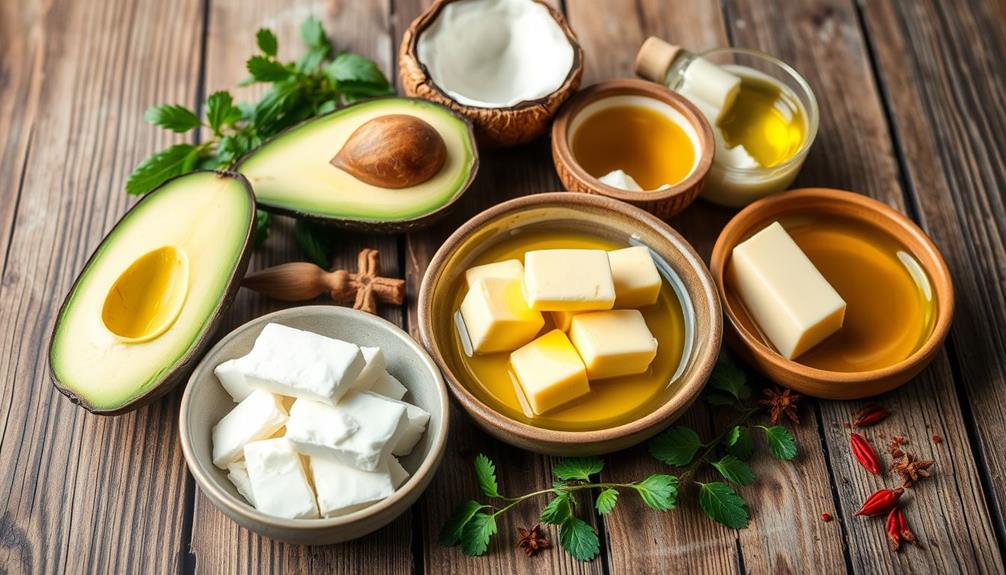
Boosting your fat intake on a keto diet can be simple and enjoyable. Start by incorporating high-fat snacks like avocado, nuts, or seeds into your daily routine. These options provide healthy fats without piling on excessive protein.
You can also whip up fat bombs, which are tasty treats made from ingredients like coconut oil and cream cheese, perfect for a quick, calorie-dense snack. To make your coffee experience even more enjoyable, consider exploring various brewing methods that can complement your keto lifestyle, such as adding coconut oil to your morning brew for an extra fat boost exploring brewing methods.
Don't forget to enhance your meals with healthy oils. Drizzle olive oil or avocado oil over salads and cooked vegetables to add both flavor and fat without increasing protein levels.
Another great tip is to blend full-fat dairy into your smoothies; heavy cream or full-fat Greek yogurt can greatly boost your fat content while keeping protein low.
Experiment with cooking techniques that utilize fats, such as sautéing vegetables in butter or coconut oil. This not only enriches your meals with healthy fats but also elevates their taste.
Benefits of Healthy Fats

Healthy fats are essential for your keto diet, offering benefits like heart health support and sustained energy.
Incorporating sources of healthy fats can help improve your overall financial health by allowing you to budget for nutritious food options, which can be a part of a well-rounded investment in your wellness common financial terms.
Not only do they help keep you feeling full, but they also enhance nutrient absorption, making it easier for your body to utilize essential vitamins.
Heart Health Support
Adding healthy fats to your diet can greatly support heart health. By choosing the right types of fats, you can improve your cholesterol profile and enhance cardiovascular function.
Healthy fats, like those found in avocados and olive oil, reduce LDL cholesterol while increasing HDL cholesterol. Omega-3 fatty acids from fatty fish and flaxseeds lower blood pressure and inflammation, considerably decreasing heart disease risk.
Additionally, diversifying your investment strategies, such as considering Gold IRAs, can provide long-term financial stability that contributes to overall wellness.
To maximize heart health through your fat intake, consider these three tips:
- Focus on Monounsaturated Fats: Incorporate nuts and seeds into your meals; they can improve your cholesterol levels and lower heart-related issues.
- Embrace Omega-3 Fatty Acids: Regularly consume fatty fish or flaxseeds to reap benefits like reduced inflammation and better blood sugar control.
- Adopt the Mediterranean Diet: Rich in healthy fats, this diet has been linked to a 30-40% reduction in coronary heart disease risk, emphasizing the importance of fat quality.
Energy and Satiety
Incorporating healthy fats into your keto diet can considerably enhance your energy levels and sense of fullness. Healthy fats are energy-dense, providing 9 calories per gram, which helps you meet your caloric needs without piling on extra protein. When you include nutrient-dense fats like avocados, nuts, and olive oil, you not only boost meal satisfaction but also enhance the flavors of your dishes.
Additionally, using essential oils for skin conditions can be a complementary approach to overall well-being while on a keto diet. These fats promote satiety by slowing digestion, leading to reduced hunger levels throughout the day. This helps you stick to your dietary goals more easily.
By consuming healthy fats from sources like fatty fish and seeds, you maintain stable energy levels, providing your body with a sustained source of fuel that keeps you energized. Moreover, the presence of healthy fats in your meals plays a significant role in improving nutrient absorption, particularly for fat-soluble vitamins A, D, E, and K.
This not only supports your overall health but also enhances your well-being, making your keto diet more effective and enjoyable. Embracing healthy fats guarantees you feel satisfied and energized, maximizing the benefits of your keto lifestyle.
Nutrient Absorption Enhancement
When you include fats in your meals, you're not just adding flavor; you're also enhancing the absorption of essential nutrients.
Healthy fats play a fundamental role in nutrient absorption, especially for fat-soluble vitamins A, D, E, and K. These vitamins are critical for immune response and bone health, making their absorption a high priority in your ketogenic diet.
Including healthy fats can markedly improve the bioavailability of antioxidants like carotenoids found in vegetables.
Here are three key benefits of adding healthy fats to your meals:
- Improved Nutrient Delivery: Healthy fats support cell membranes, ensuring ideal transport of nutrients into your cells.
- Enhanced Satiety: Fats help you feel full longer, preventing overeating and aiding in calorie control.
- Quick Energy Boost: MCTs from coconut oil are rapidly absorbed, providing immediate energy and enhancing nutrient utilization during ketosis.
Frequently Asked Questions
How to Get More Fat on Keto Without Protein?
To get more fat on keto without protein, incorporate high-fat oils into your meals, snack on pure fats like butter, enjoy avocados, use fatty seeds, and create delicious fat bombs for convenient, tasty options.
How to Increase Fat on a Keto Diet?
To increase fat on a keto diet, incorporate healthy fats like avocado and olive oil into meals. Use fat bombs as snacks, add full-fat dairy, and roast veggies in oil for added flavor and fat content.
What Has Fat but No Carbs and No Protein?
You might think finding fat without carbs or protein's tough, but oils like olive and coconut, butter, ghee, and fatty fish oil are perfect options. They boost your fat intake effortlessly, enhancing your meals!
What Happens if I Don't Eat Enough Fat on Keto?
If you don't eat enough fat on keto, you'll feel fatigued and hungry, struggle to maintain ketosis, and risk nutrient deficiencies. Your mood and cognitive function may decline, impacting overall well-being and diet adherence.
Conclusion
Incorporating healthy fats into your keto diet without ramping up protein isn't just possible—it can be delicious! You might worry about gaining weight, but remember, healthy fats can actually help you feel fuller longer, making it easier to stick to your goals. By choosing nutrient-dense sources and cooking wisely, you can elevate your meals while enjoying the benefits of healthy fats. So go ahead, indulge in that creamy avocado or drizzle of olive oil—you deserve it!
